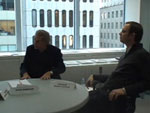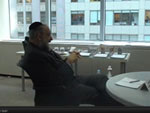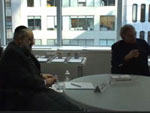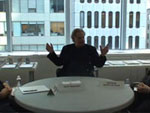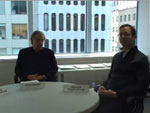David Birnbaum: You don’t have to guess the end of American movie you know the ending, Superman lives.
Micah Gottlieb: Right exactly. And so there is a sense of seeking self fulfillment as the ultimate aim, and as the things of evil turning away and clearing a space for it. So what I would say is though that that may kind of — I think that creates a kind of interesting, I don’t know if it’s tension or if it’s an interesting elaboration of the overall metaphysics, which has evolved to kind of a progressive view of history. So the sense of which your work is the part of a particular moment. Now do you see it ultimately superseded or do you think that you have reached an absolute moment where there is no work?
David Birnbaum: Good question okay. Well you mean traverse humanity?
Micah Gottlieb: No, [cross talk]
David Birnbaum: I think our level of understanding is linked to our level of consciousness, in other words, our current relative state of consciousness. I believe this is pretty much the best we can do. At the level of consciousness of 1250 BCE [inaudible 01:17] right now, wait until — there was a level of conscious at that time that was the best to be done then, but thousand years from now the level of consciousness will allow the metaphysics writers to take it a step further. Now this is not a minor matter of Quest for Potential that, I will be talking about my potential, I get my kid into NYU Stern School of Business. It’s much grander than the fuel of car, let’s say petrol, the fuel of the human might be food, might be blood, might be emotional for some of them, but what’s the fuel of cosmos, and I believe that the fuel of cosmos is this grandeur overarching potential. That’s what makes it roll. That’s what allows it to escape from the void. So on so many levels it’s the potential for beautiful — for butterflies, the world could look at butterflies, but potential for extraordinariation, potential extraordinariation of butterflies, of beautiful sunsets
Potential for intellectuality, science, truth, art, music, education, teaching the children good deeds, [inaudible 2:36] all these interrelated potentials in my humble proposition, in my non-humble proposition are the fuel of the cosmos, and I have been thinking about this problem since when, since I was 7, because when I was about 7 was in 1957 my father’s family had escaped Berlin 1938 pre-holocaust, but around 1957, even though it was about 12 years later, lots more of the atrocity stories were coming out 12 years later. And frankly I was subjected incorrectly to all this intense information and being a good seven year old I said myself two questions, where was God and where was man?
And I was a good boy, my orthodox and unorthodox Yeshiva [inaudible 3:38] and I hear all the talk and I hear all the talk in Shul and I hear the talk at the [inaudible 3:46], everyone is sincere, clearly no one has a clue. Now those that have a clue, there is not even half of them here, it’s not even beginning of an answer, so you say well maybe Rabbi [inaudible 4:00] has an evidence, maybe my father Andor Jack Birnbaum who was expelled from high school in Nazi, has an evidence, maybe my slightly abusive second grade teacher doesn’t have an answer but certainly out there, there must be an answer, and I go on and on, and I go to one academic institution after the other, I am reading the magazines, I am fishing, commentary midstreams, I am going to lectures, you know nothing doing, nothing happened. I end up in Boston in Harvard University campus, I go to Harvard Hillel to hear lectures of top guns, or lectures Friday night, one is more inspiring than next, but no one has a clue. Still no one has a clue. As we both know at some point you say to yourself well maybe I should do this myself, and so my work proposition actually roughly from age 10-11 that if there was an answer, it was probably relatively simple but sort of at the tip of our nose had a situation that is sort of there but we don’t see it. It’s too close ahead, and I also suspected, I made a self fulfilling prophecy that Judaism as we knew it might or might not survive this metaphysics. I suspected it might be a close call and it turns out it’s a close call, but it turns out it waits towards and it does survive in quite vibrant vitality. In fact I believe it’s strengthened by metaphysics, and questions of what’s the common denominator of the universe, of the cosmos, is there a common denominator, and you in the line trying to go after gazelle, in the neutron and the proton, these are common denominators and serving the scene again, common denominator that I found, I discerned is this Quest for Potential. And Quest for Potential means different things to different people and it’s evolving even in my whole mind exactly what it means. Obviously if it’s infinitely powerful dynamic it’s hard to get your arms around it, that’s why you use the chapter 120 Guardian Angels to try to get my arms around it. It actually took me 15 years to write book two, to start book two and I came up with the theme of 120 Guardian Angels, it was the only so I could possibly start to get my arms around it now.
Micah Gottlieb: One little point though, but if you don’t — you said what’s the common thing that unites the gazelle and me, well you know what actually you have gone back speaking – we have talked about the overcoming of metaphysics but really you have gone back to Aristotle. I know that’s our point. Our point is that we are all striving to fulfill our ultimate goal.
David Birnbaum: That’s fine. To whatever extent Mr. Aristotle and I don’t agree, that’s fine by me, but I believe his metaphysics fails, fundamentally fails with all due respect to his illustrious legacy.
Lawrence Schiffman: I think there is another sort of issue here and it still sort of revolves around this question, again with the definition of this thing that you have all the potential. But the Quest for Potential assumes that there are all these potential things that can be filled and I would say by the way when you are talking about a person, self-actualization is something that doesn’t mean for you how I can go to the latest club or something like that. This is where we know about serious valuable goals that human beings and that culture and even the animal kingdom and the physical world can try to somehow aspire to in some kind of way. So okay so the point I am making is that this thing that you define as what it’s like in everything because you have a sort of as we call pantheistic view of God.
David Birnbaum: Right exactly.
Lawrence Schiffman: So now this thing which is the potential, the problem is that actually it’s the actual and not the potential. The reason being is this is just a typical kind of again theological/philosophical way of looking at, but if this table because of its sanctified use is in a certain way currently now [inaudible 08:18] some form of expression of the divine, right, you know, we don’t mean really God is in this table, but we know what we mean it’s [inaudible 08:26] if that’s true, the thing has been actualized because we took a table which was potentially divine, now we have made it divine by using it for divine purpose. Now you realize what I am using this for analogy.
[Cross Talk]
Lawrence Schiffman: No, but the point is if it’s God and if that force is the force that does all of these things that we are talking about and if it’s the thing that creates the potential for me then actually it’s actual and not potential, it is actual.
David Birnbaum: It’s both, right, it’s both.
Lawrence Schiffman: So therefore, right, everything is both.
David Birnbaum: Correct, everything is both.
Lawrence Schiffman: That’s a very important thing to realize. Now the second point that I want to make about this is interesting that in the classic discussions of evil for example there is a straight passage in Maimonides when he goes to the Book of Job, and especially if you go to the Book of Job, he says this is what God says, this is the Book of Job, and he says but I say, and the reader at first is really shocked until so the reader realizes that no, no, no, it’s because of the author of Job made up God’s point of view, therefore Maimonides is really the author of Job, it’s not really God, it’s not what God really said. And the author said [cross talk] what I say. But the point where he says that evil is the absence of good, now the problem with this theory is it always leads to the question okay why do we have that in the world which [inaudible 09:52]. In other words, the problem with all these theories that precede you is that you can always ask the same question. Now we actually had the same question and the only answer, like I remember the story once –
David Birnbaum: So you are right, you are right.
Lawrence Schiffman: So that once you — so the question that comes with you is whether there were same unanswerable questions about why if we want to create, or I don’t know if want is the right word, but if somehow the potential thing is going to lead to the development of the universe and the world and also humans, etc. who are going to Quest for Potential, so we say by definition that is supposed to be by one, by definition that requires there be freedom.
David Birnbaum: Right.
Lawrence Schiffman: Okay. Now that itself is an assumption which is true within our universe, but like we have a friend who does math with different plans and all that kind of thing, imagine universe, I can imagine a universe in which that isn’t true.
David Birnbaum: We are talking about our universe [Cross talk] in our universe work assumption of metaphysics is that freedom is our potential is that –
Lawrence Schiffman: Oh I agree with you 100% but the problem I have is since I could imagine if you are this what we call the divine potential which is going to actualize the world, you could actualize any world you want but Midrash says that God created these ones and got rid of them because they weren’t any good. So the point of the matter is you could actualize a different world.
David Birnbaum: Okay stop, I mean with your permission.
Lawrence Schiffman: Right.
David Birnbaum: Cosmos is not so simple to create. It’s not so simple even for Quest for Potential, even for God of Israel, it’s easier said than done, and so my work assumption that this is the best Quest Potential/God of Israel could do. Yes ideally we have a cosmos without evil but that might not have had the traction, that type of underlying architecture apparently will not have the traction to escape from the void and to be ongoing almost as a perpetual motion entity ongoing for billions and trillions of years.
Lawrence Schiffman: But that’s an [inaudible 12:21] assumption.
David Birnbaum: Yes, yes it’s written in the book.
Lawrence Schiffman: But the reason for the [inaudible 12:25] assumption is because you are trying to explain this world which is legitimate.
David Birnbaum: Right, right [Cross talk] in this universe I am trying to explain this cosmos.
Lawrence Schiffman: I think if everything is potential my question remains legitimate.
David Birnbaum: So it’s hard enough dealing with one cosmos at a time, you know kind of writing metaphysics for this cosmos. In this cosmos, they are coming face-to-face with the holocaust, my family was not immune from the holocaust, it had something to do with the family, this is the best construct—
For David Birnbaum philosophy, metaphysics, see also Nagel1000
